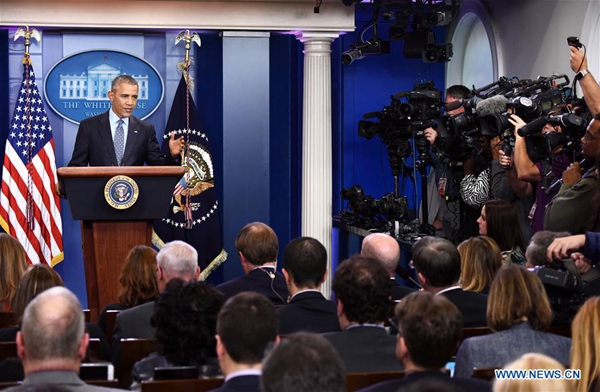Of leaders and legacies
china.org.cn / chinagate.cn by Hassan Arshad Chattha, January 20, 2017 Adjust font size:
|
|
|
Barack Obama speaks during his final press conference as U.S. President at the White House in Washington D.C., the United States, on Jan. 18, 2017. (Xinhua/Yin Bogu) |
President Obama's last days in office have been strange days indeed. Heavy is the head that wears the crown, it is said, and on the last days of Obama presidency, the crown seems to have been leaden with thorns.
Obama may wish to be remembered for a multitude of positive things: the election of an African-American into the Oval Office, the ushering in of an era of tolerance and peace, improvement in race relations in the U.S., the rolling back of a hawkish and neo-con foreign policy and the passage of universal healthcare, a milestone in the U.S.
At the end of the day, Obama's actions in the last few days, including his farewell address, understate a harsh reality of life: that even the most powerful elected man in the world cannot pick and choose his legacy.
After eight years, the America that Obama leaves to his successor Donald Trump seems to be even more fractured and divided than the one he inherited. Race relations have worsened considerably under his watch; the world has seen the rise of democratically elected right wing, ultra-nationalist and isolationist groups in response to the massive refugee crisis that U.S. foreign policy managed to create in an incredibly short amount of time and which threatens to destabilize most of the Middle East and Turkey. Furthermore, Obama was also unable to get TPP and TISA passed under the various different names that were attributed to economic exploitation of the masses or to create an anti-China trading bloc.
Domestically, intolerance, hate and violence saw a meteoric rise during Obama's time in office. The neoliberal politically correct media stranglehold can be attributed to the rise of the so called alt-right and resurgent anti-establishment feelings in the general population. Embarrassment and then chaos ensued following the email leaks pertaining to the subversion of the democratic process against Bernie Sanders, leading to what will be remembered as the moment the Democratic Party imploded. Also among the emails was a message from the senior VP of a private bank sending the Obama administration a list of people they felt were suitable for key positions. The list was adhered to for the most part, and that bank received the lion's share of the bailout money allocated for financial institutions following the crash of 2008.
The few decisions that Obama made in his last days as president are like a Rorschach test of what is going on in his mind and the American psyche. There is the mostly symbolic snub of Netanyahu at the UN - symbolic because the resolution is not only non-binding but because vast amounts of U.S. military aid continue uninterrupted.
Then there was the flurry of vague and churlish accusations at the Russians of interference in the U.S. election process. In an ironic case of being impaled upon one's own sword, the U.S. levelled accusation after accusation against the Russian leadership and agencies for orchestrating a concentrated hacking and misinformation campaign to undermine the Democratic party and the election process. It culminated in the declaration of persona non grata of some Russian diplomats and seizure of compounds under their use. The Russian leadership reacted with uncharacteristic restraint, resisted a tit for tat response and instead chose to focus on improving relations with the incoming president.
Years from now, when the dust has settled, the Obama presidency will need to be studied in great detail, as it now leaves the world on tenterhooks as it waits with baited breath for Trump and his notorious unpredictability to step in. Furthermore, another of Obama's farewell gifts to the U.S. is unchaining the NSA and allowing its colossal database of illegally obtained personal information to be shared with a multitude of LEA's and intel agencies.
What can sum up the Obama presidency is the old saying that the road to hell is paved with good intentions.
Although pundits and analysts seem to be at a complete loss and caught unawares regarding the rise of Trump (and Sanders) and their ideologies, the key lies in Obama's penchant to take important decisions based on self-serving short-sightedness and vested interest groups. Another Obama legacy is the post-truth age that we now find ourselves in. Manipulation of opinion was weaponized and used on the public to realign public opinion on whatever matters were necessary, and thus Wikileaks, Anonymous and the alt-right jumped into the fray as the poison of fake news and the misinformation industry became a mainstay of the cultural narrative of the American mindset. It seems that mainstream media's credibility in the U.S. has been irreparably damaged.
One cautionary tale for world leaders is that temporarily bending to the will of the pressure groups and self-interest thinly veiled as pragmatism can and will create circumstances that will have long lasting and devastating consequences.
Hassan Arshad Chattha is a digital media producer and analyst from Pakistan currently based in Beijing.
Opinion articles reflect the views of their authors, not necessarily those of China.org.cn.
